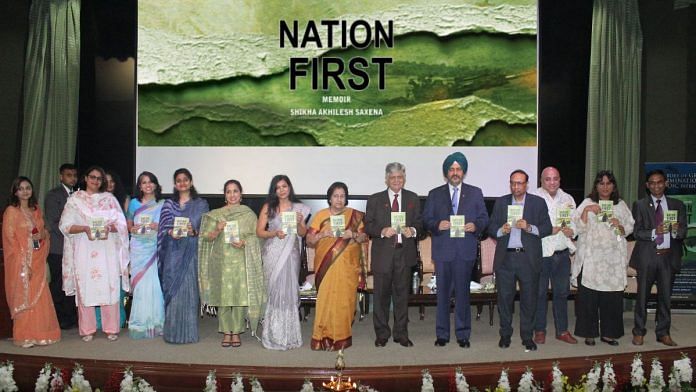New Delhi: Some impressions of war are so indelibly engraved in one’s memory that they’re almost impossible to be erased – especially for those who’ve lived through the times. Shikha Akhilesh Saxena, an Army veteran’s wife, might not have been at the forefront of the Kargil War, but she felt the tempest of a battlefield through her husband’s lived experience of fighting in the 1999 India-Pakistan conflict.
So, at the launch of her book Nation First – a Hachette India publication – which chronicles her struggle as the newly-married civilian wife of an Army officer stationed in Kargil, emotions ran deep among the 50-odd attendees at Delhi Cantonment’s Manekshaw Centre on Sunday as they recalled their own experiences of 24 years ago.
Panel member General (Retired) Ved Prakash Malik, who was the Army Chief when the Kargil War broke out, recounted how he saw “long faces” of netas (politicians) and even his colleagues whenever he visited South Block to give briefings on the battle.
“Even in the first briefing that I did to the Cabinet, they went away despite my assurance that we will win this war. The only people who gave me assurance that we shall win the war were the soldiers at the front,” he said, spelling out the countless challenges the Army faced – of terrain, equipment and even uniforms.
He also made a pinching comment on journalist Barkha Dutt, who was one of the guests of honour at the event and the only female reporter at Kargil.
“Even Barkha Dutt was a challenge for us because she and her colleagues in the media just wouldn’t accept any rules. Sometimes we got into trouble because of them; that also happened,” Malik remarked.
Dutt, however, recalled Kargil as the most “transformative experience” of her journalistic career, one she considers “a masterclass in life”.
The Padma Shri-winning journalist narrated that there was a lot of resistance from the Armed forces to allow her in an “all-male zone” and that she was determined “not to cry one drop of tear” because she had to prove herself “more than the boys”.
About the Kargil War, Dutt said that people have not fully appreciated how “we won an extraordinary war with the minimum resources”.
Also read:
A critical voice interjects
Annurag Batra, chairman and editor-in-chief of the BW Businessworld Group, was the lone critical voice among the speakers who touched upon sensitive topics like war reporting and the difference between nationalism and patriotism.
“Let me be a little more diplomatic,” he quipped. “I think we need to be more accurate on how we report on wars.”
He said that the media’s voice must be in sync with the government’s regarding national issues of strategic importance – and defence.
“But at the time, the media’s role is to be able to also ask the right questions to the government, which I don’t think the media does. In the last decade or so, even the forces have become a little more polarised than they were.”
Also read: Citizenship took a back seat to the Partition, ‘Indianess’ was never fully defined
Love in the time of war
The mood of the evening was brimming with patriotism, tales and traditions of the Army fraternity, and memories of the Kargil War.
But General Mallik brought the attention back to Shikha’s book, calling it unique.
“It’s unique for one reason: It’s the story of a young captain who goes through the battle and narrates exactly what happened. Many of the books have been written on people who didn’t come back,” he said.
The protagonist of the story, Captain (Retired) Akhilesh Saxena, was only 24 years when he was called to the battlefield, barely a month after his marriage to then-23-year-old Shikha.
Saxena was among the lucky ones who lived to see the day after being grievously injured at the Three Pimples Area in Kargil. He managed to reach the Army’s medical base after a four-hour downhill journey, with his left palm barely attached to his hand and dozens of cuts and bruises.
It took Saxena a year to recover from the harrowing experience. Knowing he wouldn’t be able to return to the field, he soon left the Services and pursued an alternate career, a path his wife helped him to navigate.
Shikha’s unwavering support gave him the strength to continue a turbulent ride. Though Nation First will be categorised as a book on Army life, at the heart of it lies a story of love in times of war.
“I have written in my book that it was an arranged marriage, and after just one month, he was gone. The bond was created because of the Kargil War, when we were in the hospital… and he told me what happened.”
(Edited by Zoya Bhatti)



